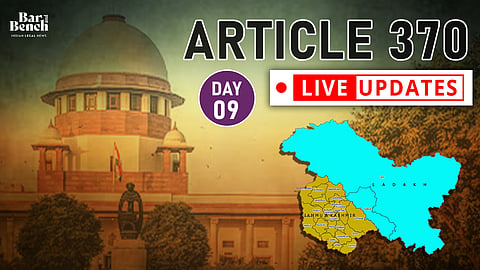- News
- Columns
- Interviews
- Law Firms
- Apprentice Lawyer
- Legal Jobs
- हिंदी
- ಕನ್ನಡ

A Constitution bench of the Supreme Court of India is hearing a batch of petitions challenging the abrogation of Article 370 of the Constitution which conferred special status on the erstwhile State of Jammu and Kashmir.
The bench comprises Chief Justice of India DY Chandrachud, and Justices Sanjay Kishan Kaul, Sanjiv Khanna, BR Gavai, and Surya Kant.
Over 20 petitions are pending before the Supreme Court challenging the Central government's 2019 decision to abrogate Article 370 of the Constitution, which resulted in the revocation of Jammu and Kashmir's special status. The erstwhile State was subsequently bifurcated into two Union Territories.
When the matters were listed in March 2020, a five-judge Constitution Bench of the Supreme Court had decided not to refer the batch of petitions to a seven-judge Constitution Bench, despite some petitioners seeking such a reference.
On August 2, the top court began final hearings in the matter with a question to the petitioners about whether the Constitution makers and Article 370 itself envisaged the provision as a permanent or temporary one.
The Court sought to know whether the Article was envisaged as a permanent provision merely because the Constituent Assembly of Jammu and Kashmir (J&K), which was empowered to recommend the deletion of the provision, ceased to exist in 1957.
On August 4, the top court asked whether the Article would become part of the basic structure of the Constitution if it is accepted that Article 370 of the Constitution became permanent when the Constituent Assembly of Jammu and Kashmir was dissolved in 1957.
During the hearing of the matter on August 9, the Court said that in a Constitutional democracy like India, the opinion of people on public issues is sought through established institutions and not referendums as in the case of Brexit in the United Kingdom.
The top court, on August 10, remarked that in no way was the integration of Jammu and Kashmir with India in 1948 conditional. The integration was absolute and complete in every which way, remarked CJI Chandrachud.
Live updates from today's hearing feature here.